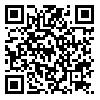

BibTeX | RIS | EndNote | Medlars | ProCite | Reference Manager | RefWorks
Send citation to:
URL: http://jdisabilstud.org/article-1-3162-en.html
2- Assistant Professor, Department of Psychology, Shahrood Branch, Islamic Azad University, Shahrood, Iran
3- Professor, Department of Psychology, Research Institute and University, Qom, Iran
4- Assistant Professor, Department of Islamic Studies, Shahrood Branch, Islamic Azad University, Shahrood, Iran
Abstract
Background & Objectives: Psychological distress can disrupt a person's daily functioning. Cognitive flexibility is one of the important variables that has a special role in mental health and has a vital role in suffering from depression, stress, and psychological problems. People with high levels of ego strength are more flexible and better equipped to handle life's challenges. However, individuals with low levels of ego strength may be more vulnerable to psychological distress. According to research, religiousness and spirituality have a significant effect on the mental and physical health of people. Multidimensional spiritual therapy can be an essential aspect of caring for people with psychological distress. Spiritual therapies can provide a sense of meaning and purpose, a sense of connection with something higher than oneself, and a source of comfort and support in difficult times. Therefore, this research aims to determine the effectiveness of multidimensional spiritual therapy focused on emotional regulation on the cognitive flexibility and ego strength of people with psychological problems.
Methods: The current research method was quasi-experimental, using a pretest-posttest design with control and experimental groups. The statistical population of this research included people with psychological distress referred to counseling and psychology clinics in Tehran City, Iran, in 2021. The sample size was determined through G*Power software so that the study has the necessary power to detect a difference of at least 1 unit in the level of self-esteem and mental well-being between the experimental and control groups. Assuming the probability of the first type of error is 5%, the probability of the second type of error is 20%, and a standard deviation of 0.9, the number of samples equals 15 people for each group. Therefore, among the statistical population, 30 qualified volunteers were entered by available sampling into the study and randomly divided into experimental and control groups (each group contains 15 people). The inclusion criteria include an interview based on the criteria of the fifth diagnostic and statistical guide for mental disorders, a score higher than 20 on the psychological distress scale, which was conducted by an expert in the field of clinical psychology, a minimum level of education diploma, not participating in other psychological interventions at the same time, and lack of debilitating mental illnesses that were diagnosed by the researcher using a clinical interview. The exclusion criteria included an absence of more than three sessions, non-observance of group therapy rules, and suffering from a mental illness that did not exist before the treatment and was identified during the implementation. After selecting the people of the sample group and before starting the treatment program, the Cognitive Flexibility Inventory (Dennis & Vander Wal, 2010) and the Psychosocial Inventory of Ego Strengths (Markstrom et al., 1997) were distributed between both groups. Then, multidimensional spiritual therapy was performed on the experimental group (in the form of 12 sessions of 90 minutes, each session once a week), and the control group was not subjected to any treatment program. In the end, the posttest was done again from both groups. Also, after the end of the research, the treatment programs implemented in this research were implemented in the control group to maintain ethical standards. Data analysis was carried out in two parts: descriptive statistics and inferential statistics. At the level of descriptive statistics, frequency, mean, and standard deviation were used, and at the level of inferential statistics, univariate covariance analysis was used. Data analysis was done using SPSS software version 24, and the significance level of the tests was considered to be 0.05.
Results: The results showed that in the variable of cognitive flexibility for the subscales of perception of evidence (p<0.001) and alternative to human behavior (p<0.001) and the variable of ego strength for the subscales of hope (p<0.001), will (p<0.001), goal (p=0.008), love (p=0.002) and wisdom (p<0.001), there was a significant difference between the experimental and control groups in the posttest, after removing the effect of the pretest.
Conclusion: Based on the findings of the research, multidimensional spiritual therapy focused on emotion regulation can be effective in increasing cognitive flexibility and ego strength in people with psychological distress.
| Rights and permissions | |
 |
This work is licensed under a Creative Commons Attribution-NonCommercial 4.0 International License. |


